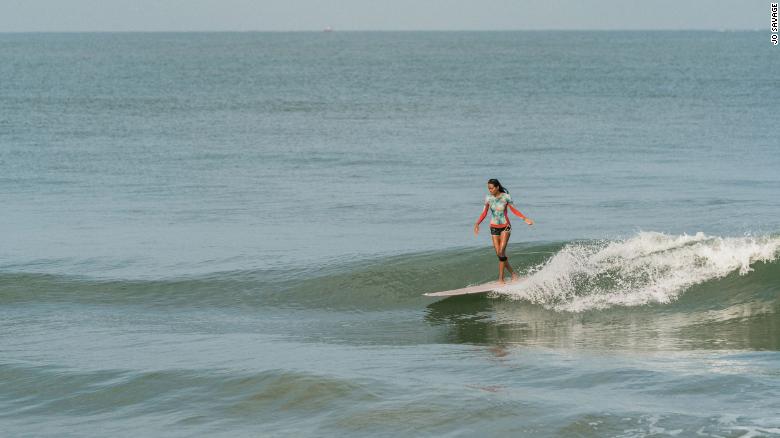November 19 (CNN) – Despite an abundance of coastline, long stretches of beach and swell on both sides of the country, India has traditionally been a surf-shy nation. But over the past decade, the tide has gradually started to turn.
Ishita Malaviya, India’s first professional female surfer and one of the early pioneers of the sport in her country, remembers googling “surfing in India” back in 2007, only for nothing to show up.
When she took up the sport at university on the advice of a German exchange student, Malaviya estimates that there were only 13 professional surfers in India — a drop in the ocean amid what was then a population of 1.2 billion.
Hooked by the sport from the moment she caught her first wave, she and her partner Tushar Pathiyan started the Shaka Surf Club while studying at university in Manipal.
“I remember smiling on my first wave, all the way to shore and all the way back home from the beach,” Malaviya tells CNN Sport.
In the early days, she and Pathiyan shared one board between them before they started to fix up broken boards from travelling surfers passing through the country.
Back home in Mumbai, their friends and family had doubts about their new pastime.
“People we grew up with, our friend circle, were like, ‘What are you guys doing? You’re wasting your life, you’ve become beach bums.’ They thought we’d lost the plot,” says Malaviya.
“We didn’t have any money. Our parents were like, ‘You can surf but don’t expect us to buy you a board.'”
‘Cursed place’
Malaviya finished her degree in journalism and moved to the coast to focus her efforts on expanding the Shaka Surf Club, which provides lessons, board rentals and accommodation for people of all ages.
Over the years, she has not only seen the sport grow in India — estimating there are now a couple hundred people surfing competitively — but has also witnessed a shift in attitude towards the ocean, particularly among the fishing communities that have taken up surfing.
“They come from generations of people who look at the ocean as just a place of hard work, struggle, income — it’s very transactional,” says Malaviya.
“This is probably the first generation of fishermen in India that are going to the ocean and actually having fun.”
She points to the number of drowning deaths in India — close to 33,000 last year, according to a report released by the government’s National Crime Records Bureau — as a reason people have been reluctant to regard the sea as a place of leisure
“There’s a major fear of the ocean,” adds Malaviya. “Most of the people don’t know how to swim … for us it was like, they’re living in paradise (but) they look at the ocean like this cursed place, you know?”
ADVERTISEMENT






























































